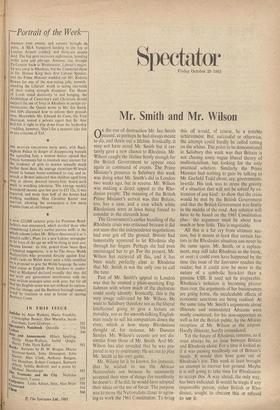Mr. Smith and Mr. Wilson O N the eve of destruction
Mr. Ian Smith paused, as perhaps he had always meant to do, and threw out a lifeline. Ironically, it may not have saved Mr. Smith but it cer- tainly gave a new chance to Rhodesia. Mr. Wilson caught the lifeline firmly enough for the British Government to appear once again in command of events. The Prime Minister's presence in Salisbury this week was doing what Mr. Smith's did in. London two weeks ago, but in reverse. Mr. Wilson was making a direct appeal to the Rho- desian people. The meaning of the British Prime Minister's arrival was that Britain, too, has a case, and a case which white Rhodesians were at least being forced to consider in the eleventh hour.
The Government's earlier handling of the Rhodesia crisis was criticised because it did not seem that the independence negotiations had ever got off the ground. Britain had lamentably appeared to let Rhodesia slip through her fingers. Perhaps she had even encouraged her to go. For the present, Mr. Wilson has retrieved all this, and it has been made perfectly clear in Rhodesia that Mr. Smith is not the only one to call the tune.
Part of Mr. Smith's appeal in London was that he seemed a plain-speaking Eng- lishman with whom much of the electorate could easily identify. Ironically, this is the very image cultivated by Mr. Wilson. He went to Salisbury therefore not as the liberal intellectual going to give a lecture on morality, nor as the smooth-talking English- man ready to sell his compatriots down the river, which is how many Rhodesians thought of, for instance, Mr. Duncan Sandys. Mr. Wilson's accents are not dis- similar from those of Mr. Smith. And .Mr. Wilson has also revealed that he was pre- pared to try to overtrump. He set out to play Mr. Smith at his own game.
Mr. Wilson let it be known, for instance, that he wished to see the African Nationalists not because he necessarily accepted their view of things (for manifestly he doesn't : if he did. he would have adopted their ideas on the use of force). The purpose was to move the Nationalists closer to agree- ing to work the 1961 Constitution. To bring this off would, of course, be a notable achievement. But, successful or otherwise, the attempt could hardly be called ratting on the whites. The point to be demonstrated in Salisbury this week was that Britain is not chasing some vague liberal theory of multi-racialism, but looking for the only practical solution. Similarly the Prime Minister had nothing to gain by talking to Mr. Garfield Todd about, say, governments- in-exile. His task was to stress the gravity of a situation that will not be solved by ex- tremism of any kind : to show that the crisis would be met by the British Government and that the British Government was firtrily in the middld of the road. Any solution will have to be based on the 1961 Constitution plus : the argument must be about how much or how little. This is negotiable.
All this is a far cry from ultimate suc- cess, but it means at least that certain fac- tors in the Rhodesian situation can never be the same again. Mr. Smith, or a replace- ment, may still take Rhodesia to the brink, or over; it could even have happened by the time this issue of the Spectator reaches the reader; but it could now be more in the nature of a symbolic hara-kiri than a genuine UDI. It need not be irreparable. Rhodesia's isolation is becoming plainer than ever, the arguments of her businessmen are going home, the incalculable effects of economic sanctions are being realised. At the same time Mr. Smith's arguments about illiterate and intimidated Africans were neatly countered, for his non-supporters as well as for the British public, by the African reception of Mr. Wilson at the airport. Hardly illiterate, hardly intimidated: Yet the future of Rhodesia remains. as it must always be. an issue between Britain and Rhodesia alone. For a time it looked as if it was passing needlessly out of Britain's hands. It would then have gone out of Rhodesia's too. This week at least brought an attempt to recover lost ground. Maybe it is still going to take time for Rhodesians to accept this. A way ahead, the only way, has been indicated. It would be tragic if any responsible person, either British or Rho- desian, sought to obscure this or refused to see it.






































 Previous page
Previous page